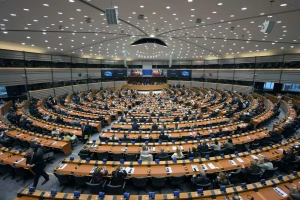 In 2011, the world’s population reached the landmark figure of 7 billion, much to the alarm of the United Nations Population Fund (UNFPA) and many in the media. Symbolically, Baby Seven Billion was not born on the European continent. The United Nations predicts that by 2050, the global population will hit the impressive number of 9.6 billion, but that the population in Europe will actually shrink unless drastic changes are made.
In 2011, the world’s population reached the landmark figure of 7 billion, much to the alarm of the United Nations Population Fund (UNFPA) and many in the media. Symbolically, Baby Seven Billion was not born on the European continent. The United Nations predicts that by 2050, the global population will hit the impressive number of 9.6 billion, but that the population in Europe will actually shrink unless drastic changes are made.
The demographic decline in Europe has been the subject of serious debate in the public sphere for years, and has been attributed to many factors, including the ‘economic burden’ of having a child.
A recent report by Giampaolo Lanzieri, senior statistician for Eurostat, the European Commission’s statistical body, examines the demographic crisis in light of the financial crisis that began in 2008.
The Eurostat report, aptly titled “Towards a Baby Recession in Europe,” examines the fertility trends of 31 European countries since 2008, when the economic recession started. The report shows that 2008 marked the additional decline in birth rates across Europe. The total number of live births fell from 5.6 million in 2004 to 5.4 million in 2008, a 3.5% decline. Likewise, the number of countries reporting a decline in live births increased: in 2007, one country out of 31 faced a decreasing birth rate, compared to 26 out of 31 countries in 2008.
The average number of children per woman across the region is now 1.51 children, well below the requisite 2.1 children per woman needed to sustain a country’s current population.
Spain, which has been significantly hit by the economic crisis and has one of the highest youth unemployment rates at over 40 percent, is experiencing a mass exodus of young people to other more stable countries in search of a better life. In 2013, Spain’s fertility rate has registered at 1.48. Experts say that Spain will be one of the first countries to suffer from a shrinking population. Spain is not the only country at risk, however. Greece faces an even worse situation with a fertility rate of 1.4. Poland registered even lower at 1.38. Ireland, despite being one of the first countries bailed out by the EU, has managed to be one of the few EU countries to meet the required rate of 2.1 in 2013.
Immigration plays a role in the short term solution- it has been said that Germany requires 200,000 immigrants every year to fill the gap between the number of jobs that the require to be filled and the actual population – but the fact remains that if Europe does not increase their birth rates, they will face a bleak future.
The Eurostat report identified the trend of people’s putting off having children until they are financially stable as a key-contributing factor to the birth rate decline. This is obviously a normal response. However, if the economy continues to suffer, how long will couples wait?
The title of Joel Kotkin’s 2012 Forbes article gives away his argument about Europe’s demise: “What’s Really Behind Europe’s Decline? It’s The Birth Rates, Stupid.” This indicates the dilemma young people face: they need jobs and security to support their children, but in order for the economy to improve, birth rates must first increase.
What can young people do? Obviously, the solution to this problem is multi-faceted and it will be a long road to recovery, but it is clear that especially young people—must invest in the human person and in the future. This investment reflects a recognition of the potential of the human person to generate wealth using knowledge, skills and creativity.
The first step in young people’s investment in the future is by investing in themselves. They must invest in their integral development, including their mental, emotional, physical, and spiritual dimensions, by pursuing their education, careers, and personal growth.
More than that, we young people must invest in building a culture that values families and having children. We must vote for people who will ensure that we have policies that will facilitate this – whether it be tax breaks for families with more than one child, or policies which recognize that the family is the basic unit of society.
During this process, it is important for young people to maintain hope in the future, despite bleak population statistics. As such, they need to recognize the roles they can play in ensuring that the future is one to be hopeful of, especially getting married and having children.
To get married and have children is to recognize that the future is worth giving to a child. Children make that future better, and are desperately needed in Europe now, for they become workers who contribute to the economy and pay into the pension system.
If Europe is to have a bright and sustainable economic future, European youth must be willing to get married and have children, and not be daunted by the current economic crisis or the growing global population. They must believe in the potential of each person to contribute to building a better world than we have today.
Agnes King is Director of Operations for Europe of World Youth Alliance, an international organization that promotes the dignity of the human person through policy, culture, and education and that has special consultative status with the United Nations and European Union, among other institutions.




